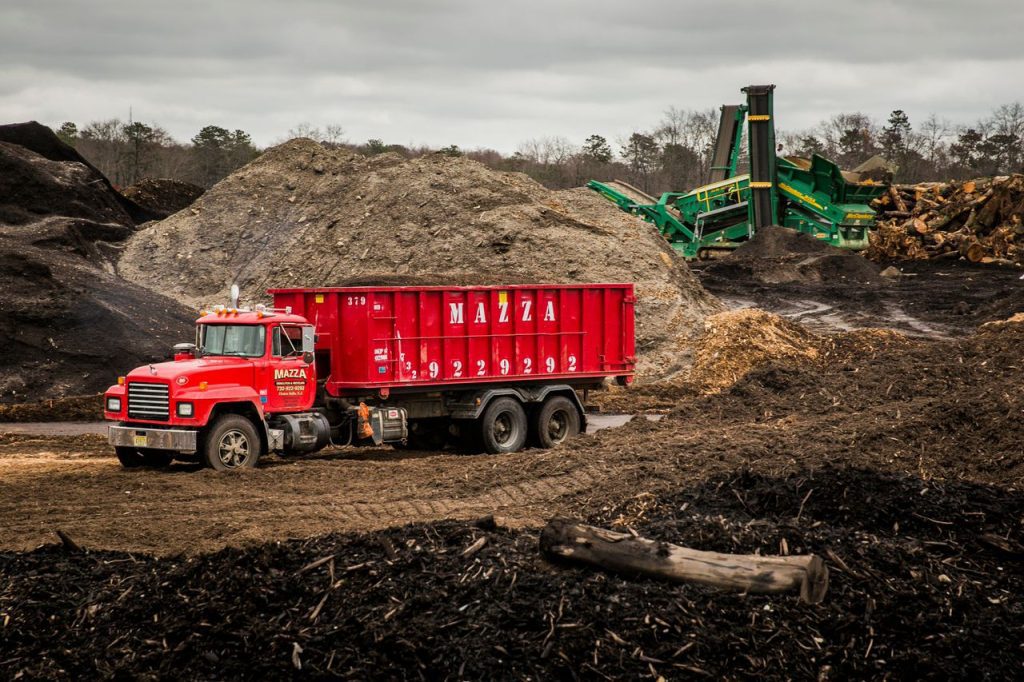
Mazza’s bagging line can produce 25 to 30 bags per minute, according to a company representative. | Courtesy of Mazza Recycling
Mazza Recycling increased its capacity to bag mulch and, in tandem, started offering its own line of bagged mulch products made from scrap wood.
The New Jersey-based company in October spent $1.3 million to build a 17,500-square-foot bagging facility and add a bagging line with the capacity to create 5.2 million mulch and soil bags annually. A press release noted that the addition “aligns with their mission by creating locally sourced products in an already established market.”
Mazza secured a partnership to bag ScottsMiracle-Gro consumer products around the same time, Brynn Mosello, sustainability and communications director, told Resource Recycling. It’s a family-owned and operated waste collection, recycling and disposal company that opened in 1964 and later added Mazza Scrap Recycling and Mazza Mulch. Mazza began creating mulch from cleared trees and wood debris in 2015 and now produces topsoil, various dyed mulches, a certified playground mulch and a natural hardwood mulch. Prior to adding the bagging line, the company sold the material in bulk to municipalities, playgrounds, amusement parks and commercial businesses.
The point of the expansion “was for us to take our existing line of business and just have another outlet for consumers,” Mosello said, “and grow the existing business to reach a wider audience.”
Making the mulch
The bagging line is fully automated. It has a Yaskawa robot that stacks the individual bags onto pallets as well as Hamer Fischbein equipment, a Kasebill hopper and incline, and a Wulftec wrapper.
Once bagged, the ScottsMiracle-Gro products are trucked to box stores, such as Lowes and Home Depot., while Mazza’s mulch bags are available for purchase to local flower farms and nurseries.
Carlos Batista, plant operations manager, said there was some delay waiting for the equipment to arrive, but once it did the team installed it themselves and “spent a lot of time learning and dialing it in, experimenting and testing just to see what would work best for us.”
“We’ve had a couple hiccups, nothing too serious, more so operator error in learning how to switch between two different materials, mulch and soils, and making sure you’re getting the programs dialed in,” Batista said. “But after the testing process, we’re running between 25 and 30 bags per minute, which is 22,000 to 27,000 bags per day.”
In the press release, Jimmy Mazza, president and CEO, said adding the line was a learning experience for the company.
“Like most of our newly constructed facilities, there was a lot involved in bagging mulch that we weren’t familiar with in the beginning,” Mazza said. “However, with the popularity of the Mazza Mulch branch of our company, it made sense to take the 500,000-plus cubic yards of mulch we produce from natural wood debris and safely ship it in bags that can reach a larger amount of people.”
Looking forward
Batista said that “next year can only be better.”
“Our future for the line looks wonderful and bright,” he said. “As we are learning and producing and we get the word out, I would like to say that the system next year will probably be pushed to its limits and that’s what I would like to see.”
Mosello agreed that next year will likely see more demand for the company’s product, since the delays receiving the equipment this year caused the company to miss the earlier mulch season.
“We’re looking to now get the word out and get ready for next mulch season,” she said.
And as the company pushes one line to the limit, Mosello said there’s space for a second line to be added. “When building the infrastructure surrounding this first line we anticipated a hopeful future second line,” she said. “So we have enough square footage in the building for that.”
Mosello said the extra capacity would be not only for Mazza’s products, but potentially future partnerships as well.
More stories about organics
- California extends compostable labeling law
- CA compostable labeling deadline worries producers
- Organics collection programs take care, creativity